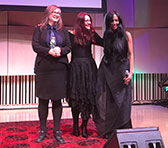5 December 2018
An action plan towards gender equality in music: Cat Hope
2018 Peggy Glanville-Hicks Address
 Image: Cat Hope, Dobromila Jaskot & Karina Utomo after the Melbourne address and premiere of Silenced.
Image: Cat Hope, Dobromila Jaskot & Karina Utomo after the Melbourne address and premiere of Silenced. Composer and academic Cat Hope delivered the 2018 Peggy Glanville-Hicks Address in three Australian cities last week, calling for, and drafting some steps towards, an action plan for gender equality and empowerment in our music industry.
In her speech, Hope drew on recent research by her own working group (with Dawn Bennett, Sally Macarthur, Sophie Hennekam and Talisha Goh), as well as data from recent studies focusing on Australian film and popular music, to show how women are currently challenged in the music industry in terms of their income, inclusion, decision-making, mentoring, education, and the nature of their workplace. She also noted that discussions focusing on men and women should gradually start to take the form of a more general debate, including non-gender conforming people.
Hope summarised her relatively late realisation of the continued existence and effects of gender bias:
'I believed that my generation was the one that had benefited from the work of feminist women before me, having forged the path I was treading. But that was before the first female Australian Prime Minister began her work. I observed Julia Gillard's term with disbelief. The way Gillard was talked to and talked about shocked me, but I was also shocked at how people got away with it in the public arena, because I - like many women - understood women's rights to be human rights.'
'I started to look at my own world, and music, with a different perspective. I noted that some opportunities I had missed out on may have been for reasons other than that I wasn't good enough, which is what I would tell myself at the time. I looked at the things I was making - the music I curated in my new music ensemble Decibel's concerts, the make-up of my collaborations and so on, and reassessed how I would work in future. I curated an all-women program "After Julia, in 2014", thematically driven by women composers' responses to the Gillard years. I was surprised at some of the commentary about an all-women program being "old-fashioned" and even "reverse sexism", a term I hadn't heard before then. This indicated to me that the path hadn't been forged after all, or, maybe, it was still too early to walk it.'
In addition to hard data - about the pay gap; men's over-representation in positions of power; female composers' under-representation in concert programs; etc. - Hope also touched on issues harder to define in numeric terms: unconscious bias, systemic privilege, the myth of meritocracy, and the failure to support female artists and students in ways that would build their confidence and support them when entering male-dominated areas of music practice - or simply choosing instruments traditionally considered 'masculine'.
Hope's address ended with a survey of current, promising developments such as a new wave of emerging artists and academics entering the field, aware of their important role as decision-makers, curators, teachers and researchers; new initiatives and programs; and the increasing popularity of practice-led postgraduate degrees in music, which Hope saw as a new avenue for women artists as well as a source of contextual information around process and intent for all artists.
She also reminded her audience that women's full participation and representation in our music culture is not only dependent on women but requires men in positions of power to acknowledge the need for change and to act on it.
'Some of us do have the ability and circumstances to rise up and meet challenges. Some organisations are thinking, trialling, and implementing different methods to make change - formal quotas with the aim of "shocking" the system into a new frame, "mindful" programming, where people in positions of power and decision-making endeavour to just look harder and be conscious of the need for balance.'
The address concluded with the premiere of a new work Silenced, commissioned by Hope for the occasion and collectively composed by Hope, WA-based composer Dobromila Jaskot and Indonesian-born, Melbourne-based vocalist Karina Utomo.
'Artistic collaboration and collective authorship can be', Hope pointed out, '...powerful ways to overcome some stereotypical expectations of the creator as a "master creator" and the performer as subservient to their single, more often than not, masculine, voice.'
The next Peggy Glanville-Hicks address in 2019 will be presented by the AMC, following the closure of the New Music Network at the end of this year (more details on Resonate).
> Read the full transcript of Hope's Peggy Glanville-Hicks Address on Limelight magazine (5 December 2018).
> See also: The New Music Network closes - AMC to continue Peggy Glanville-Hicks address (Resonate 28 November 2018)
© Australian Music Centre (2018) — Permission must be obtained from the AMC if you wish to reproduce this article either online or in print.
Comments
Be the first to share add your thoughts and opinions in response to this article.
You must login to post a comment.